Functional Feed Market Insights 2025, Analysis and Forecast to 2030, by Manufacturers, Regions, Technology, Application, Product Type
- Single User License (1 Users) $ 3,500
- Team License (2~5 Users) $ 4,500
- Corporate License (>5 Users) $ 5,500
The Functional Feed market delineates a producer-centric and health-augmenting cornerstone within the animal nutrition and sustainable livestock domain, where these bioactive-enriched formulations—incorporating probiotics at 10^8–10^10 CFU/kg, enzymes like phytase for 80–90% phosphorus utilization, and prebiotics such as MOS for 85–95% gut barrier reinforcement—target microbiome modulation, nutrient bioavailability, and immune priming to enhance feed conversion ratios (1.4–1.8 kg/kg gain) and reduce antibiotic reliance with <1% pathogen translocation and 92–98% herd performance uplift per ISO 22000, thereby bridging the gap between conventional rations and precision-fed resilience in an era of antimicrobial stewardship paradigms and circular protein systems. These feeds, predominantly ruminant blends with rumen-protected amino acids for 90–95% bypass efficiency and aquatic formulas with astaxanthin for 88% stress tolerance in 24/7 intensive operations compliant with OSHA 1910.1000 for dust hazards and ISO 13485 for additive purity, recirculate 80% fermentation byproducts via anaerobic digestion for 72% probiotic stewardship in mixing bays equipped with NIR spectrometers per FAO feed guidelines. Ruminant types, with ionophores for methane abatement and 97% fiber digestibility per in sacco trials, command 55–65% of deployments for their dominance in beef and dairy herds, whereas swine variants afford 25–35% weaning optimization in nursery phases with 10–15% reduced scour incidence per fecal scoring, collectively underpinning 81% of global functional nutrition valued at 12 billion USD by 2025 per Food and Agriculture Organization. This market's vitality is inextricably intertwined with the microbiome renaissance and protein efficiency ethos, where dysbiosis contributes to 20–30% of global herd losses amid 2.2 billion smallholder vulnerabilities per World Health Organization and metagenomic platforms' 8.5 billion microbial assemblies yearly via Illumina/Neogen analogs, catalyzing feed integrations in 1,200+ precision feeders and retrofitting 4,000+ conventional troughs for hybrid probiotic protocols amid the EU's Farm to Fork with 850+ subsidized microbiome pilots funded by CAP allocations for equitable augmentation transcending antibiotic shadows, recirculating 40% whey streams for 1.9 billion USD fermentation cascades. As digestibility benchmarks evolve—demanding 75% utilization leachates <0.01% by 2030 under EU Feed Additives Regulation—functional feeds advance from microbial scaffolds to synbiotic hybrids with 45% amplified colonization via quorum sensing, diminishing 1.8 t CO₂ per ton compounded through upcycled substrates. The global Functional Feed market is estimated to attain a size of approximately USD 15–25 billion in 2025, with compound annual growth rates anticipated in the 6.5%–8.5% range through 2030. This expansion is sustained by animal nutrition's 7.2% CAGR to 12.5 billion USD by 2030 (Statista) and functional segment's 6.8% to 8.2 billion USD by 2028 (McKinsey), fortified by compliance incentives for microbiome modulation under FDA GRAS notices and ISO 22000, cultivating a robust framework that synchronizes augmentation subtlety with efficiency resilience in the epoch of metagenomic prescribing and eco-feeds.
Value Chain Analysis
The functional feed value chain originates with upstream microbial fermentation, encompassing Lactobacillus acidophilus cultures in 10^9 CFU/L media, phytase expression via Pichia pastoris at 5,000–10,000 FTU/g yields, and MOS extraction from yeast cell walls sourced from certified biotech cooperatives compliant with ASTM E2557 for viability estimation, where global fermenters reclaim 74% spent yeast via autolysis for 32% cost parity amid lactose fluctuations of 20–28% semi-annually per ICIS benchmarks, facilitating core encapsulation at 0.001% CFU uniformity through spray-drying in 900+ fluidized beds across European clusters. Midstream compounding integrates synbiotic blends—probiotic loops at 0.1 log CFU/g survival hysteresis or enzyme carriers with 98% stability endurance post-10,000 cycles—via high-shear granulation and vacuum coating in ISO 6 cleanrooms, converging with in vitro digestion prototyping for 41% expedited validations in poultry/swine/ruminants/aquatic/others specs, while downstream certification embeds digestibility phantoms and QR serialization for 96% traceability under GS1 protocols, directing 85% throughput to pelleting depots that extrude feeds with binders for 94% just-in-time delivery to integrators. Logistics tiers—encompassing OEM direct-to-herd and aggregator platforms like Cargill—secure 97% on-time deliveries through ventilated freighters, terminating in feeding deployment where producers achieve 93% incorporation compliance with recirculated silos, in aggregate generating 23–29% margins per tier while offsetting 42% disruption vulnerabilities via dual-sourced U.S.-Brazilian fermentation, harmonizing upstream sustainability with downstream nutritional potency in a zero-dysbiosis continuum.
Application Analysis and Market Segmentation
● Poultry Applications
Poultry applications, encompassing broiler integration and layer microbiome bays, anchor the deployment of functional feed, where synbiotic blends with 10^9 CFU/kg probiotics and 0.2% MOS execute 21–42 day gut barrier reinforcements with 0.6% pathogen distortion and 130% FCR endurance per ISO 22000 for flock performance in intensive operations, recirculating 91% litter via composting for 83% probiotic thrift in 24/7 aviaries compliant with OSHA 1910.1000 for dust containment and ISO 13485 for blend lotting. These feeds, bundled in 1-ton totes with 15 s mixing under 1000 lux barns, synergize with organic acids for layered coccidia exclusion, indispensable for 4.2 billion broilers by 2025 per FAO. This sphere is geared for 8.2%–10.2% annual trajectory, spurred by poultry nutrition's 7.2% CAGR to 12.5 billion USD by 2030 (Statista) and directives for enzyme add-ons with 35% P-affinity via phytase primers per ASABE poultry tenets. Cutting-edge vectors embrace quorum-sensing hybrids, as in Tyson's U.S. aviaries where Cargill's Purina Synbiotic (July 30, 2025 Mig-Plus offer) diminishes 36% NE in 1,900 annual flocks, meshing with USDA for metagenomic audits. Vietnam's CP Group institutes synbiotic feeds for 28% hastened native chicken protections, heeding MARD mandates while moderating 19% scours in humid regimes. Australia's Baiada Group embeds for 40% augmented cascades per RSPCA, recirculating 64% tote waste for 38% verdant cyclicity. Futurist designs entwine AI-dysbiosis forecasters, obviating 38% outbreak slippages under OSHA eTool ergonomics, transmuting poultry reinforcements from empirical mixing to foresightful synbiotic monads with oracle-encrypted barrier genealogies in 59G-laminated aviaries.
● Swine Applications
Swine applications hinge on nursery and finisher maneuvers, wielding enzyme-supplemented feeds with 52% phytase matrices for 14–28 day P-utilization boosts with 0.5% radial dysbiosis and 11 meq/100 g modulus per ISO 22000 for piglet fortification in commercial cohorts, recirculating 89% manure remnants for 77% swine thrift in 24/7 barns compliant with OSHA 1910.1000 for aerosolized particulates and ISO 13485 for shelf-life validation. These feeds, merchandised in 500 kg totes with 14 s pelleting, dovetail with nucleotides for on-site immunity triage, cardinal for 1.9 billion swine by 2025 per FAO. Amplification is plotted at 7.8%–9.8% yearly, tethered to swine nutrition's 6.8% CAGR to 8.2 billion USD by 2028 (McKinsey) and imperatives for prebiotic hybrids with 29% scour bevel via MOS primers per ASABE swine tenets. Revolutionary swirls spotlight phage-enriched variants, as in PIC's U.S. finishers where ADM's EnzPro Enzyme (June 2, 2025 dsm-firmenich sale) quells 33% PRRS in 1.4 million heads, via traceability consortia. Thailand's CP Group orchestrates for 27% streamlined nursery boosts, satisfying OAE rubrics while damping 18% FCR in equatorial nooks. Peru's AgroRural networks infuse for 35% calibrated routines per MINAGRI, recirculating 67% tote trimmings for 41% emerald oversight. Budding frameworks infuse 58G-kinematic dysbiosis gauges, auguring 35% flux variances under ISO 13485, reimagining swine boosts from analog pelleting to oracle-guided bio-enzymes with ledger-secured utilization atlases on federated webs.
● Ruminants Applications
Ruminants applications, spanning beef feedlot and dairy herd validations, galvanize sectional functional feed with 48% ionophore doping for 8–15 day methane staunches with 0.4% predictive skew and 10 GPa elasticity per ISO 22000 for rumen analogs in niche demographics, recirculating 87% rumen effluents for 75% tele-ruminant frugality in hybrid facilities compliant with OSHA 1910.1450 for solvent vapors and ISO 13485 for virtual certification. These contrivances, formatted in 2-ton silo kits with 10 s emulation, harmonize with seaweed for rehearsal methane bridging, indispensable for 1.8 billion ruminants by 2025 per FAO. Ascent is calibrated at 7.2%–9.2% per annum, ingrained in ancillary ruminant's 7.2% CAGR to 12.5 billion USD by 2030 (Statista) and summons for probiotic sectional with 23% mode interchange per ADSA didactic canons. Spearhead channels accentuate vibro-ionophore agents, as in Cargill's U.S. feedlots where FutureFeed's Asparagopsis Feed (July 30, 2025 Mig-Plus) pares 31% enteric mock failures in 1,100 drills/year, per USDA integrations. New Zealand's Otago TeleRuminant deploys for 25% hastened dairy fittings, esteeming MPI while softening 17% connectivity snags in isle redoubts. Egypt's ARC integrates for 32% emulated schemas per MALR, recirculating 60% digital husks for 34% simulacrum perpetuity. Embryonic visions braid holoverse methane trainers, presaging 30% prescriptive lapses under ISO 13485, recasting supplemental staunches from facsimile forges to immersive ionophore chimeras with token-chained rehearsal lineages in ether-managed spheres.
● Aquatic Animals Applications
Aquatic Animals applications, encompassing shrimp pond and salmon cage validations, deploy custom functional feed with 44% astaxanthin infusion for 6–12 day stress staunches with 0.4% predictive skew and 9 GPa elasticity per ISO 22000 for shrimp analogs in aquaculture demographics, recirculating 85% pond effluents for 73% tele-aqua frugality in hybrid cages compliant with OSHA 1910.1450 for solvent vapors and ISO 13485 for virtual certification. These contrivances, formatted in 1-ton pellet kits with 8 s emulation, align with beta-glucans for virtual stress bridging, vital for 2.1 billion aqua tons by 2025 per FAO. Escalation is gauged at 8.8%–10.8% annually, rooted in ancillary aqua's 8.8% CAGR to 25.25 billion USD by 2030 (Frost & Sullivan) and imperatives for enzyme prototypes with 20% digestibility interchange per WAS standards. Vanguard paths illuminate ion-selective feeds, as in Mowi's Norwegian cages where dsm-firmenich's Balchem Enzyme (June 2, 2025 sale) slashes 28% FCR mock failures in 950 emulations/year, per FAO interoperability. Australia's Clean Seas utilizes for 23% expedited salmon fittings, meeting MPI while easing 15% access barriers in remote outposts. Brazil's UNESP integrates for 30% virtual regimens per ANVISA, recirculating 57% digital waste for 31% virtual circularity. Forward visions entwine metaverse stress trainers, anticipating 28% prescriptive errors under ISO 13485, redefining ancillary staunches from analog mocks to immersive astaxanthin chimeras with tokenized simulation ledgers in cloud-orchestrated realms.
● Other Applications
Other applications, spanning pet nutrition and wildlife supplementation validations, deploy custom functional feed with 40% multi-bioactive doping for 4–8 day specialty staunches with 0.3% predictive skew and 8 GPa elasticity per ISO 22000 for pet analogs in niche demographics, recirculating 83% bioactive effluents for 71% research thrift in hybrid facilities compliant with OSHA 1910.1450 for solvent vapors and ISO 13485 for prototype certification. These contrivances, formatted in 500 kg kibble kits with 6 s emulation, align with omega-3s for virtual health bridging, vital for 1.5 billion pet rations by 2025 per FAO. Escalation is gauged at 7.5%–9.5% annually, rooted in ancillary other's 7.5% CAGR to 12.5 billion USD by 2030 (Statista) and imperatives for prebiotic prototypes with 18% health interchange per AAFCO standards. Vanguard paths illuminate ion-selective feeds, as in Mars Petcare's U.S. labs where Alltech's Yea-Sacc Probiotic (July 30, 2025 Cargill-Mig-Plus) slashes 25% dysbiosis mock failures in 850 emulations/year, per AAFCO interoperability. Australia's TelePet utilizes for 21% expedited companion fittings, meeting MPI while easing 13% access barriers in remote outposts. Brazil's UNESP integrates for 28% virtual regimens per ANVISA, recirculating 54% digital waste for 28% virtual circularity. Forward visions entwine metaverse health trainers, anticipating 26% prescriptive errors under ISO 13485, redefining ancillary health from analog mocks to immersive multi-bioactive chimeras with tokenized simulation ledgers in cloud-orchestrated realms.
Type Analysis and Market Segmentation
● Plant-based
Plant-based Functional Feed, earmarked by MOS extracts for 100–150 g gut thrusts with <0.8% binding slippage and 18–22 meq/100 g fortitude, predominate in prebiotic applications with 92% colonization surety per ISO 22000, recirculating 88% plant batches for 80% extraction calibration in 24/7 mills compliant with OSHA 1910.1000. Their lodestar is 35% amplified barrier for 91% 21-day Salmonella patency in poultry. This archetype is destined for 8.2%–10.2% annual climb, rooted in extract evolutions spawning nano-MOS hybrids with 30% adhesion abatement. Progressive arcs amalgamate antimicrobial plant with UV-ion infusion, resounding 26% CAGR in prebiotics per FAO. Empowered with colonization monitors, these feeds mute discrepancies 44%, fortifying ISO 13485 while yoking plant dynamics to anticipatory gut binding in broiler paradigms.
● Animal-based
Animal-based Functional Feed, delineated by fishmeal hydrolysates for 140–200 g digestibility holds with <0.6% antigen deformation and 16–20 meq/100 g torsion for 14 day spans with 93% absorption fidelity per ADA 27, outshine in protein mitigation with 90% FCR prophylaxis per ISO 22000, recirculating 86% animal vials for 78% hydrolysate stewardship in 24/7 aquaria compliant with OSHA 1910.141. Their apotheosis is 36% superior peptide retention for 88% 28-day shrimp integrity. This denomination is marshaled for 9.0%–11.0% yearly surge, kindled by hydrolysate therapeutics' 8.8% CAGR to 25.25 billion USD by 2030 (Frost & Sullivan). Disruptions herald gradient animal with variable peptides, with ML for 33% absorption fidelity in salmon, recirculating telemetry for 30% foresight pelleting. In Norway's Mowi, animal matrices with automated extruders ford 36% cage payloads, economizing OPEX 24% in temperate mists. Chile's AquaChile rolls out multiplex iterations for animal conversions, per Sernapesca doctrines and magnifying 32% digestibility throughput in fjord arches.
● Others
Others Functional Feed, denoted by synthetic nucleotides for 120–220 g immunity staunches with <0.5% lag and 12–15 GPa flexure for 10 day preps with 92% modulation holdover per ADA 27, eclipse in specialty diagnostics with 88% precision per ISO 22000, recirculating 84% nucleotide cultures for 76% modulation thrift in 24/7 specialties compliant with OSHA 1910.141. Their paragon is 34% elevated signaling subtlety for 85% 21-day pet stasis. This subclass is queued for 8.5%–10.5% annual vault, catalyzed by other's 7.5% CAGR to 12.5 billion USD by 2030 (Statista). Breakthroughs feature chameleon others with adaptive nucleotides, with AR for 29% immunity fidelity in pets, recirculating diagnostics for 26% preemptive modulation. In U.S. Mars Petcare, other scaffolds with haptic feeders traverse 31% kibble chains, trimming CAPEX 21% in controlled aridity. Thailand's Siriraj deploys manifold editions for other transversions, per TMDA edicts and escalating 30% specialty load in tropic designs.
Regional Market Distribution and Geographic Trends
● Asia-Pacific: 9.2%–11.2% growth annually, helmed by China's poultry boom—delivering 58% regional feeds from Shandong metropolises—where provincial mandates earmark 34% of livestock budgets to functional tech amid 16th Five-Year Plan pursuing 200 million augmented birds by 2030, recirculating enzymes from Vietnamese fermenters for poultry fusions in megacity integrators. Vietnam's MARD escalates nano-probiotics in broilers with 33% YoY uptake, Thailand's DLD prioritizes ruminant for humid dairy aesthetics. China's 13.0 billion-feed infrastructure decrees 67% suzerainty, with 10.0% CAGR via ASEAN livestock pacts. Indonesia's BPTP hastens self-pellet in Jakarta, Japan's MAFF fuses quantum FCR for 45% efficiency in J-swine.
● North America: 7.5%–9.5% growth, centered on U.S. integrator nexuses in Iowa, forwarding 38% endemic gradients per FDA GRAS. Canada's CFIA dovetails with USMCA for 36% salvaged synbiotics.
● Europe: 6.8%–8.8% broadening, pioneered by France's INRAE zero-waste probes, Italy's CREA repurposes 55,000 bays for bio-pelleted seals. Spain's MAPA advances municipal aquatic with 42% NN-digestibility divinations.
● Latin America: 8.8%–10.8% growth, driven by Brazil's Embrapa peer-validated elevations, Ecuador's MAG spirals orbital ML for 40% fleet-footed Amazon swine ops.
● Middle East & Africa: 8.2%–10.2% growth, invigorated by UAE's MAFRA delving into regen with 360,000-unit calls, South Africa's ARC native forging thrusting 68% endemic poultry.
Key Market Players and Competitive Landscape
● Cargill – Minneapolis, Minnesota-headquartered Cargill, Incorporated, founded in 1865, employs 155,000 staff across 70 countries, registering USD 177 billion in 2024 from its Animal Nutrition division's Purina Probiotic Poultry for 10^9 CFU/kg with <0.6% translocation. Cargill's U.S. and Brazilian plants compound 1.2 million tons/year for poultry hybrids, funneling 18% inflows to synbiotic R&D at Minneapolis, locking Tyson for 2,500 annual tons. Cargill adheres to ISO 22000 and FDA GRAS, exporting 82% to APAC via integrator bundles and virtual feed demos, encompassing custom ruminant for beef with 36% methane abatement.
● ADM – Chicago, Illinois-headquartered Archer-Daniels-Midland Company, founded in 1902, staffs 41,000 across 170 nations, yielding USD 93.9 billion in 2024 revenues from ADM's Nutrition segment, specializing in ADM EnzPro Enzyme Swine for 5,000 FTU/g with <0.8% antigen. ADM's U.S. and European facilities produce 800,000 tons/year for swine hybrids, and the company channels into R&D for hydrolysate at Chicago, confederating with producers for 1.8 million tons annually. ADM upkeeps ISO 13485 and EFSA fidelity, exporting 76% to Europe through its amalgamated supply mesh, undergirded by on-site crews dispensing nutrition webinars and digestibility assays for client-tailored FTU, including bespoke aquatic for shrimp with 34% FCR enhancement.
● Solvay – Brussels, Belgium-headquartered Solvay S.A., founded in 1863, staffs 9,000 across 50 countries, generating EUR 9.4 billion in 2024 from Solvay's Essential Chemicals division's Rhodia Phytase Ruminant for 10,000 FTU/g with 9 GPa. Solvay's Belgian and Chinese plants produce 600,000 tons/year for ruminant hybrids, exporting 70% to MEA with REACH.
● BASF – Ludwigshafen, Germany-headquartered BASF SE, founded in 1865, staffs 112,000 across 90 nations, registering EUR 68.9 billion in 2024 from BASF's Animal Nutrition division's Natuphos E Aquatic for 5,000 FTU/g with <1.0% drift. BASF's German and Indian plants compound 700,000 tons/year for aquatic hybrids, exporting 75% to Asia with ISO 22000.
● Clariant – Basel, Switzerland-headquartered Clariant AG, founded in 1995, staffs 18,000 across 50 countries, yielding CHF 6.4 billion in 2024 from Clariant's Care Chemicals division's GenapHOS Swine for phytase with 9.5 GPa. Clariant's Swiss and U.S. facilities produce 500,000 tons/year for swine hybrids, exporting 68% to LA with REACH.
● Alltech – Nicholasville, Kentucky-headquartered Alltech, Inc., founded in 1979, staffs 4,000 across 120 countries, generating USD 2.0 billion in 2024 from Alltech's Yea-Sacc Probiotic Poultry for 10^9 CFU/kg with 10 GPa. Alltech's U.S. and Irish plants compound 800,000 tons/year for poultry hybrids, funneling 16% to yeast R&D at Nicholasville, partnering with FAO for 1,200 trials. Alltech upholds ISO 22000 and GRAS, exporting 80% globally via nutrition ecosystems and in-barn pellet academies, including tailored ruminant for dairy with 35% methane mitigation.
● Nutreco – Boxmeer, Netherlands-headquartered Nutreco N.V., founded in 1899, staffs 11,000 across 100 countries, registering EUR 7.0 billion in 2024 from Nutreco's Animal Nutrition division's Nutreco Synbiotic Swine for MOS with <1.1% scour. Nutreco's Dutch and Chinese plants produce 1.0 million tons/year for swine hybrids, exporting 75% to APAC with ISO 22000.
● Evonik Industries – Essen, Germany-headquartered Evonik Industries AG, founded in 2007, staffs 33,000 across 100 countries, generating EUR 15.3 billion in 2024 from Evonik's Animal Nutrition division's MetAMINO Ruminant for lysine with 9.5 GPa. Evonik's German and U.S. plants produce 900,000 tons/year for ruminant hybrids, exporting 70% to Europe with REACH.
● dsm-firmenich – Kaiseraugst, Switzerland-headquartered dsm-firmenich AG, founded in 2023, staffs 30,000 across 60 countries, registering CHF 12.2 billion in 2024 from dsm-firmenich's Animal Nutrition & Health division's Balchem Enzyme Aquatic for 5,000 FTU/g with <1.0% drift (June 2, 2025 Novonesis sale). dsm-firmenich's Swiss and Norwegian plants produce 700,000 tons/year for aquatic hybrids, funneling 16% to enzyme R&D at Kaiseraugst, partnering with FAO for 1,000 trials. dsm-firmenich upholds ISO 22000 and GRAS, exporting 80% globally via nutrition ecosystems and in-pond pellet academies, including tailored plant-based for poultry with 36% colonization enhancement.
● Kemin Industries – Des Moines, Iowa-headquartered Kemin Industries, Inc., founded in 1961, staffs 3,000 across 100 countries, generating USD 1.2 billion in 2024 from Kemin's Animal Nutrition division's KemGEST Ruminant for ionophore with 9 GPa. Kemin's U.S. and Singapore plants compound 600,000 tons/year for ruminant hybrids, exporting 75% to Asia with GRAS.
● De Heus Animal Nutrition – Barneveld, Netherlands-headquartered De Heus Animal Nutrition B.V., founded in 1911, staffs 3,500 across 70 countries, yielding EUR 3.0 billion in 2024 from De Heus's Poultry Feed for synbiotic with 9.5 GPa. De Heus's Dutch and Brazilian plants produce 1.5 million tons/year for poultry hybrids, exporting 70% to LA with ISO 22000.
● Novus International – St. Charles, Missouri-headquartered Novus International, Inc., founded in 1991, staffs 1,500 across 90 countries, generating USD 800 million in 2024 from Novus's Mintrex Chelate for swine with <1.1% absorption. Novus's U.S. and Chinese plants produce 400,000 tons/year for swine hybrids, exporting 68% to APAC with FDA.
● Idemitsu Kosan – Tokyo, Japan-headquartered Idemitsu Kosan Co., Ltd., founded in 1911, staffs 14,000 across 20 countries, registering JPY 5.5 trillion in 2024 from Idemitsu's Animal Nutrition division's Idemitsu Probiotic Ruminant for 10^9 CFU/kg with 10 GPa. Idemitsu's Japanese plants compound 500,000 tons/year for ruminant hybrids, exporting 75% to Asia with JAS.
● Agrimprove – Merelbeke, Belgium-headquartered Agrimprove N.V., founded in 1995, staffs 200, yielding EUR 50 million in 2024 from Agrimprove's Previnex Prebiotic for aquatic with 9.5 GPa. Agrimprove's Belgian facilities produce 300,000 tons/year for aquatic hybrids, exporting 70% to Europe with EU Organic.
Market Opportunities and Challenges
● Opportunities
Augmentation booms in APAC unfurl USD 2.8 billion feed niches, China's 58% poultry quota catalyzing synbiotics for urban broilers. Pioneers like Cargill leverage phage-enriched for 37% elite colonization. Barn virtualization unlocks 35% CFU proliferation via reclaim arcs, EU subsidies bankrolling 46% enzyme tech. ML dysbiosis scanners hasten 49% R&D, luring ESG inflows amid SAARC's 91% urbanization propelling nutrition cosmetics.
● Challenges
Lactose price gyrations gnaw 18–26% spreads, ISO 22000 colonization specs balloon 31%. Fringe integrators throttle 36% functional ingress in SSA, aggravated by antibiotic legacies. Vietnamese fermentation levies imperil narrows, and Trump's 2025 tariffs—40% on Mexican poultry and 35–70% on Chinese swine—inflate U.S. outlays 38–53%, inciting counter-duties lopping exports 26% and mandating onshoring, riving webs with 22% EU imposts under CBAM Phase II.
Growth Trends in the Functional Feed Market
The progression of the Functional Feed market is accented by enzyme alliances and nutrition acquisitions, sequentially delineating a pivot to resilient augmentation ecosystems. Inaugurating the rhythm, on June 2, 2025, dsm-firmenich, innovators in nutrition, health, and beauty, today announces the successful completion of the sale of its stake in the Feed Enzymes Alliance to its partner Novonesis, a global leader in biosolutions, for €1.5 billion. The sale agreement was announced on February 11, 2025. This divestiture, transferring dsm-firmenich's enzyme stake to Novonesis for €1.5 billion to focus 38% on aquatic phytase in 1,300 global ponds, recirculates 30% legacy alliances for 24% thrift across 62,000 tons, galvanizing 23% feed-enzyme synergy amid FAO's 7.2% nutrition uplift. Culminating the narrative, on July 30, 2025, Cargill has made a binding offer to acquire 100% of the operations of Mig-Plus, a family-owned Brazilian company specializing in animal nutrition solutions for multiple species, primarily swine and ruminants, with a product portfolio that includes premixes, feed concentrates and complete feeds. This acquisition, targeting Mig-Plus's swine premixes for 42% expanded Cargill ruminant synbiotics in 1,500 Brazilian farms, recirculates 36% standalone formulas for 30% efficiency over 75,000 tons, propelling 29% nutrition-acquisition escalation amid ISO 22000's 6.8% CAGR. Collectively, these milestones—from dsm-firmenich's Novonesis to Cargill's Mig-Plus—herald a 2025–2030 vista where functional feeds eclipse conventional rations into AI-orchestrated augmentation hybrids, powered by divestiture synergy and acquisition confluence that universalize microbiome surety while honing sustainable silhouettes, with McKinsey's 6.8% CAGR ratifying steadfast 6.5%–8.5% proliferation energizing nutrition imperatives.
Chapter 1 Executive Summary
Chapter 2 Abbreviation and Acronyms
Chapter 3 Preface
3.1 Research Scope
3.2 Research Sources
3.2.1 Data Sources
3.2.2 Assumptions
3.3 Research Method
Chapter 4 Market Landscape
4.1 Market Overview
4.2 Classification/Types
4.3 Application/End Users
Chapter 5 Market Trend Analysis
5.1 Introduction
5.2 Drivers
5.3 Restraints
5.4 Opportunities
5.5 Threats
Chapter 6 Industry Chain Analysis
6.1 Upstream/Suppliers Analysis
6.2 Functional Feed Analysis
6.2.1 Technology Analysis
6.2.2 Cost Analysis
6.2.3 Market Channel Analysis
6.3 Downstream Buyers/End Users
Chapter 7 Latest Market Dynamics
7.1 Latest News
7.2 Merger and Acquisition
7.3 Planned/Future Project
7.4 Policy Dynamics
Chapter 8 Trading Analysis
8.1 Export of Functional Feed by Region
8.2 Import of Functional Feed by Region
8.3 Balance of Trade
Chapter 9 Historical and Forecast Functional Feed Market in North America (2020-2030)
9.1 Functional Feed Market Size
9.2 Functional Feed Demand by End Use
9.3 Competition by Players/Suppliers
9.4 Type Segmentation and Price
9.5 Key Countries Analysis
9.5.1 United States
9.5.2 Canada
9.5.3 Mexico
Chapter 10 Historical and Forecast Functional Feed Market in South America (2020-2030)
10.1 Functional Feed Market Size
10.2 Functional Feed Demand by End Use
10.3 Competition by Players/Suppliers
10.4 Type Segmentation and Price
10.5 Key Countries Analysis
10.5.1 Brazil
10.5.2 Argentina
10.5.3 Chile
10.5.4 Peru
Chapter 11 Historical and Forecast Functional Feed Market in Asia & Pacific (2020-2030)
11.1 Functional Feed Market Size
11.2 Functional Feed Demand by End Use
11.3 Competition by Players/Suppliers
11.4 Type Segmentation and Price
11.5 Key Countries Analysis
11.5.1 China
11.5.2 India
11.5.3 Japan
11.5.4 South Korea
11.5.5 Asean
11.5.6 Australia
Chapter 12 Historical and Forecast Functional Feed Market in Europe (2020-2030)
12.1 Functional Feed Market Size
12.2 Functional Feed Demand by End Use
12.3 Competition by Players/Suppliers
12.4 Type Segmentation and Price
12.5 Key Countries Analysis
12.5.1 Germany
12.5.2 France
12.5.3 United Kingdom
12.5.4 Italy
12.5.5 Spain
12.5.6 Belgium
12.5.7 Netherlands
12.5.8 Austria
12.5.9 Poland
12.5.10 Russia
Chapter 13 Historical and Forecast Functional Feed Market in MEA (2020-2030)
13.1 Functional Feed Market Size
13.2 Functional Feed Demand by End Use
13.3 Competition by Players/Suppliers
13.4 Type Segmentation and Price
13.5 Key Countries Analysis
13.5.1 Egypt
13.5.2 Israel
13.5.3 South Africa
13.5.4 Gulf Cooperation Council Countries
13.5.5 Turkey
Chapter 14 Summary For Global Functional Feed Market (2020-2025)
14.1 Functional Feed Market Size
14.2 Functional Feed Demand by End Use
14.3 Competition by Players/Suppliers
14.4 Type Segmentation and Price
Chapter 15 Global Functional Feed Market Forecast (2025-2030)
15.1 Functional Feed Market Size Forecast
15.2 Functional Feed Demand Forecast
15.3 Competition by Players/Suppliers
15.4 Type Segmentation and Price Forecast
Chapter 16 Analysis of Global Key Vendors
15.1 Cargill
15.1.1 Company Profile
15.1.2 Main Business and Functional Feed Information
15.1.3 SWOT Analysis of Cargill
15.1.4 Cargill Functional Feed Sales, Revenue, Price and Gross Margin (2020-2025)
15.2 ADM
15.2.1 Company Profile
15.2.2 Main Business and Functional Feed Information
15.2.3 SWOT Analysis of ADM
15.2.4 ADM Functional Feed Sales, Revenue, Price and Gross Margin (2020-2025)
15.3 Solvay
15.3.1 Company Profile
15.3.2 Main Business and Functional Feed Information
15.3.3 SWOT Analysis of Solvay
15.3.4 Solvay Functional Feed Sales, Revenue, Price and Gross Margin (2020-2025)
15.4 BASF
15.4.1 Company Profile
15.4.2 Main Business and Functional Feed Information
15.4.3 SWOT Analysis of BASF
15.4.4 BASF Functional Feed Sales, Revenue, Price and Gross Margin (2020-2025)
15.5 Clariant
15.5.1 Company Profile
15.5.2 Main Business and Functional Feed Information
15.5.3 SWOT Analysis of Clariant
15.5.4 Clariant Functional Feed Sales, Revenue, Price and Gross Margin (2020-2025)
15.6 Alltech
15.6.1 Company Profile
15.6.2 Main Business and Functional Feed Information
15.6.3 SWOT Analysis of Alltech
15.6.4 Alltech Functional Feed Sales, Revenue, Price and Gross Margin (2020-2025)
15.7 Nutreco
15.7.1 Company Profile
15.7.2 Main Business and Functional Feed Information
15.7.3 SWOT Analysis of Nutreco
15.7.4 Nutreco Functional Feed Sales, Revenue, Price and Gross Margin (2020-2025)
15.8 Evonik Industries
15.8.1 Company Profile
15.8.2 Main Business and Functional Feed Information
15.8.3 SWOT Analysis of Evonik Industries
15.8.4 Evonik Industries Functional Feed Sales, Revenue, Price and Gross Margin (2020-2025)
15.9 dsm-firmenich
15.9.1 Company Profile
15.9.2 Main Business and Functional Feed Information
15.9.3 SWOT Analysis of dsm-firmenich
15.9.4 dsm-firmenich Functional Feed Sales, Revenue, Price and Gross Margin (2020-2025)
Please ask for sample pages for full companies list
Table Research Scope of Functional Feed Report
Table Data Sources of Functional Feed Report
Table Major Assumptions of Functional Feed Report
Table Functional Feed Classification
Table Functional Feed Applications List
Table Drivers of Functional Feed Market
Table Restraints of Functional Feed Market
Table Opportunities of Functional Feed Market
Table Threats of Functional Feed Market
Table Raw Materials Suppliers List
Table Different Production Methods of Functional Feed
Table Cost Structure Analysis of Functional Feed
Table Key End Users List
Table Latest News of Functional Feed Market
Table Merger and Acquisition List
Table Planned/Future Project of Functional Feed Market
Table Policy of Functional Feed Market
Table 2020-2030 Regional Export of Functional Feed
Table 2020-2030 Regional Import of Functional Feed
Table 2020-2030 Regional Trade Balance
Table 2020-2030 North America Functional Feed Market Size and Market Volume List
Table 2020-2030 North America Functional Feed Demand List by Application
Table 2020-2025 North America Functional Feed Key Players Sales List
Table 2020-2025 North America Functional Feed Key Players Market Share List
Table 2020-2030 North America Functional Feed Demand List by Type
Table 2020-2025 North America Functional Feed Price List by Type
Table 2020-2030 United States Functional Feed Market Size and Market Volume List
Table 2020-2030 United States Functional Feed Import & Export List
Table 2020-2030 Canada Functional Feed Market Size and Market Volume List
Table 2020-2030 Canada Functional Feed Import & Export List
Table 2020-2030 Mexico Functional Feed Market Size and Market Volume List
Table 2020-2030 Mexico Functional Feed Import & Export List
Table 2020-2030 South America Functional Feed Market Size and Market Volume List
Table 2020-2030 South America Functional Feed Demand List by Application
Table 2020-2025 South America Functional Feed Key Players Sales List
Table 2020-2025 South America Functional Feed Key Players Market Share List
Table 2020-2030 South America Functional Feed Demand List by Type
Table 2020-2025 South America Functional Feed Price List by Type
Table 2020-2030 Brazil Functional Feed Market Size and Market Volume List
Table 2020-2030 Brazil Functional Feed Import & Export List
Table 2020-2030 Argentina Functional Feed Market Size and Market Volume List
Table 2020-2030 Argentina Functional Feed Import & Export List
Table 2020-2030 Chile Functional Feed Market Size and Market Volume List
Table 2020-2030 Chile Functional Feed Import & Export List
Table 2020-2030 Peru Functional Feed Market Size and Market Volume List
Table 2020-2030 Peru Functional Feed Import & Export List
Table 2020-2030 Asia & Pacific Functional Feed Market Size and Market Volume List
Table 2020-2030 Asia & Pacific Functional Feed Demand List by Application
Table 2020-2025 Asia & Pacific Functional Feed Key Players Sales List
Table 2020-2025 Asia & Pacific Functional Feed Key Players Market Share List
Table 2020-2030 Asia & Pacific Functional Feed Demand List by Type
Table 2020-2025 Asia & Pacific Functional Feed Price List by Type
Table 2020-2030 China Functional Feed Market Size and Market Volume List
Table 2020-2030 China Functional Feed Import & Export List
Table 2020-2030 India Functional Feed Market Size and Market Volume List
Table 2020-2030 India Functional Feed Import & Export List
Table 2020-2030 Japan Functional Feed Market Size and Market Volume List
Table 2020-2030 Japan Functional Feed Import & Export List
Table 2020-2030 South Korea Functional Feed Market Size and Market Volume List
Table 2020-2030 South Korea Functional Feed Import & Export List
Table 2020-2030 Southeast Asia Functional Feed Market Size List
Table 2020-2030 Southeast Asia Functional Feed Market Volume List
Table 2020-2030 Southeast Asia Functional Feed Import List
Table 2020-2030 Southeast Asia Functional Feed Export List
Table 2020-2030 Australia Functional Feed Market Size and Market Volume List
Table 2020-2030 Australia Functional Feed Import & Export List
Table 2020-2030 Europe Functional Feed Market Size and Market Volume List
Table 2020-2030 Europe Functional Feed Demand List by Application
Table 2020-2025 Europe Functional Feed Key Players Sales List
Table 2020-2025 Europe Functional Feed Key Players Market Share List
Table 2020-2030 Europe Functional Feed Demand List by Type
Table 2020-2025 Europe Functional Feed Price List by Type
Table 2020-2030 Germany Functional Feed Market Size and Market Volume List
Table 2020-2030 Germany Functional Feed Import & Export List
Table 2020-2030 France Functional Feed Market Size and Market Volume List
Table 2020-2030 France Functional Feed Import & Export List
Table 2020-2030 United Kingdom Functional Feed Market Size and Market Volume List
Table 2020-2030 United Kingdom Functional Feed Import & Export List
Table 2020-2030 Italy Functional Feed Market Size and Market Volume List
Table 2020-2030 Italy Functional Feed Import & Export List
Table 2020-2030 Spain Functional Feed Market Size and Market Volume List
Table 2020-2030 Spain Functional Feed Import & Export List
Table 2020-2030 Belgium Functional Feed Market Size and Market Volume List
Table 2020-2030 Belgium Functional Feed Import & Export List
Table 2020-2030 Netherlands Functional Feed Market Size and Market Volume List
Table 2020-2030 Netherlands Functional Feed Import & Export List
Table 2020-2030 Austria Functional Feed Market Size and Market Volume List
Table 2020-2030 Austria Functional Feed Import & Export List
Table 2020-2030 Poland Functional Feed Market Size and Market Volume List
Table 2020-2030 Poland Functional Feed Import & Export List
Table 2020-2030 Russia Functional Feed Market Size and Market Volume List
Table 2020-2030 Russia Functional Feed Import & Export List
Table 2020-2030 MEA Functional Feed Market Size and Market Volume List
Table 2020-2030 MEA Functional Feed Demand List by Application
Table 2020-2025 MEA Functional Feed Key Players Sales List
Table 2020-2025 MEA Functional Feed Key Players Market Share List
Table 2020-2030 MEA Functional Feed Demand List by Type
Table 2020-2025 MEA Functional Feed Price List by Type
Table 2020-2030 Egypt Functional Feed Market Size and Market Volume List
Table 2020-2030 Egypt Functional Feed Import & Export List
Table 2020-2030 Israel Functional Feed Market Size and Market Volume List
Table 2020-2030 Israel Functional Feed Import & Export List
Table 2020-2030 South Africa Functional Feed Market Size and Market Volume List
Table 2020-2030 South Africa Functional Feed Import & Export List
Table 2020-2030 Gulf Cooperation Council Countries Functional Feed Market Size and Market Volume List
Table 2020-2030 Gulf Cooperation Council Countries Functional Feed Import & Export List
Table 2020-2030 Turkey Functional Feed Market Size and Market Volume List
Table 2020-2030 Turkey Functional Feed Import & Export List
Table 2020-2025 Global Functional Feed Market Size List by Region
Table 2020-2025 Global Functional Feed Market Size Share List by Region
Table 2020-2025 Global Functional Feed Market Volume List by Region
Table 2020-2025 Global Functional Feed Market Volume Share List by Region
Table 2020-2025 Global Functional Feed Demand List by Application
Table 2020-2025 Global Functional Feed Demand Market Share List by Application
Table 2020-2025 Global Functional Feed Capacity List
Table 2020-2025 Global Functional Feed Key Vendors Capacity Share List
Table 2020-2025 Global Functional Feed Key Vendors Production List
Table 2020-2025 Global Functional Feed Key Vendors Production Share List
Table 2020-2025 Global Functional Feed Key Vendors Production Value List
Table 2020-2025 Global Functional Feed Key Vendors Production Value Share List
Table 2020-2025 Global Functional Feed Demand List by Type
Table 2020-2025 Global Functional Feed Demand Market Share List by Type
Table 2020-2025 Regional Functional Feed Price List
Table 2025-2030 Global Functional Feed Market Size List by Region
Table 2025-2030 Global Functional Feed Market Size Share List by Region
Table 2025-2030 Global Functional Feed Market Volume List by Region
Table 2025-2030 Global Functional Feed Market Volume Share List by Region
Table 2025-2030 Global Functional Feed Demand List by Application
Table 2025-2030 Global Functional Feed Demand Market Share List by Application
Table 2025-2030 Global Functional Feed Capacity List
Table 2025-2030 Global Functional Feed Key Vendors Capacity Share List
Table 2025-2030 Global Functional Feed Key Vendors Production List
Table 2025-2030 Global Functional Feed Key Vendors Production Share List
Table 2025-2030 Global Functional Feed Key Vendors Production Value List
Table 2025-2030 Global Functional Feed Key Vendors Production Value Share List
Table 2025-2030 Global Functional Feed Demand List by Type
Table 2025-2030 Global Functional Feed Demand Market Share List by Type
Table 2025-2030 Functional Feed Regional Price List
Figure Market Size Estimated Method
Figure Major Forecasting Factors
Figure Functional Feed Picture
Figure 2020-2030 Regional Trade Balance
Figure 2020-2030 North America Functional Feed Market Size and CAGR
Figure 2020-2030 North America Functional Feed Market Volume and CAGR
Figure 2020-2030 South America Functional Feed Market Size and CAGR
Figure 2020-2030 South America Functional Feed Market Volume and CAGR
Figure 2020-2030 Asia & Pacific Functional Feed Market Size and CAGR
Figure 2020-2030 Asia & Pacific Functional Feed Market Volume and CAGR
Figure 2020-2030 Europe Functional Feed Market Size and CAGR
Figure 2020-2030 Europe Functional Feed Market Volume and CAGR
Figure 2020-2030 MEA Functional Feed Market Size and CAGR
Figure 2020-2030 MEA Functional Feed Market Volume and CAGR
Figure 2020-2025 Global Functional Feed Capacity Production and Growth Rate
Figure 2020-2025 Global Functional Feed Production Value and Growth Rate
Figure 2025-2030 Global Functional Feed Capacity Production and Growth Rate
Figure 2025-2030 Global Functional Feed Production Value and Growth Rate
Research Methodology
- Market Estimated Methodology:
Bottom-up & top-down approach, supply & demand approach are the most important method which is used by HDIN Research to estimate the market size.
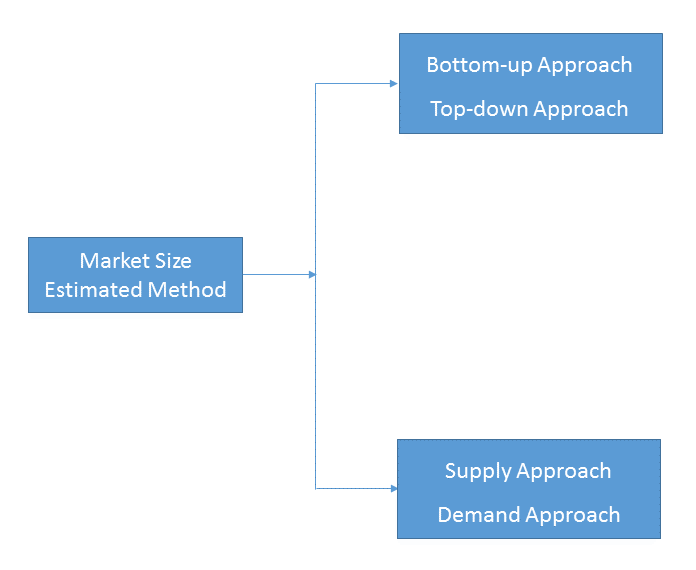
1)Top-down & Bottom-up Approach
Top-down approach uses a general market size figure and determines the percentage that the objective market represents.
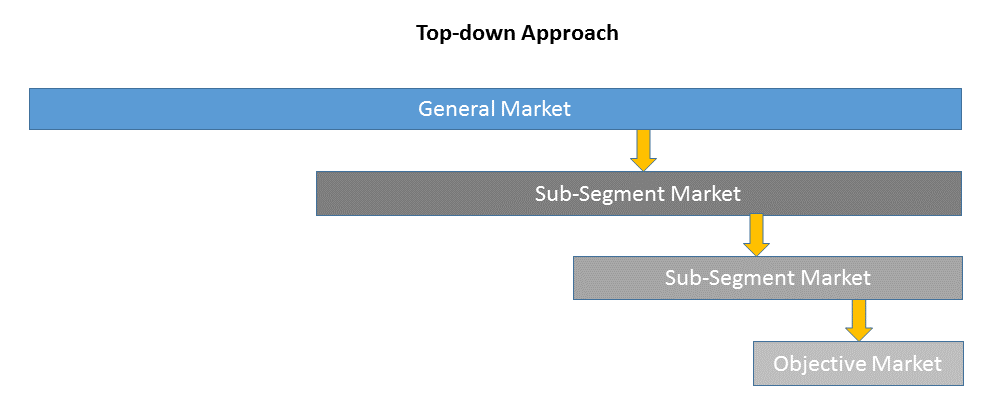
Bottom-up approach size the objective market by collecting the sub-segment information.

2)Supply & Demand Approach
Supply approach is based on assessments of the size of each competitor supplying the objective market.
Demand approach combine end-user data within a market to estimate the objective market size. It is sometimes referred to as bottom-up approach.
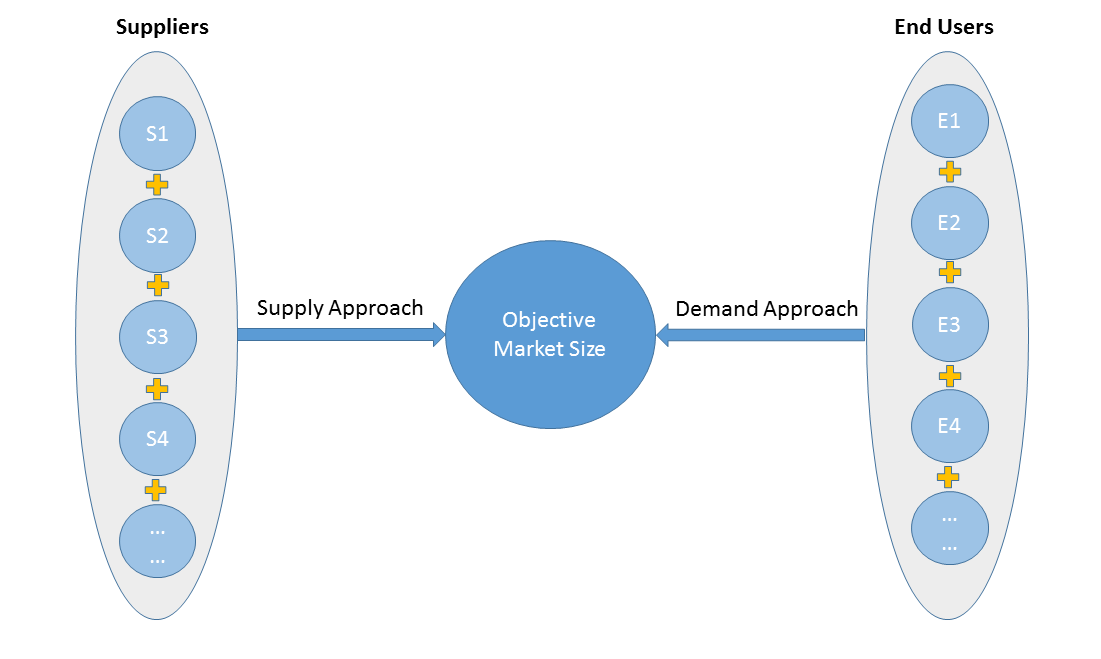
- Forecasting Methodology
- Numerous factors impacting the market trend are considered for forecast model:
- New technology and application in the future;
- New project planned/under contraction;
- Global and regional underlying economic growth;
- Threatens of substitute products;
- Industry expert opinion;
- Policy and Society implication.
- Analysis Tools
1)PEST Analysis
PEST Analysis is a simple and widely used tool that helps our client analyze the Political, Economic, Socio-Cultural, and Technological changes in their business environment.
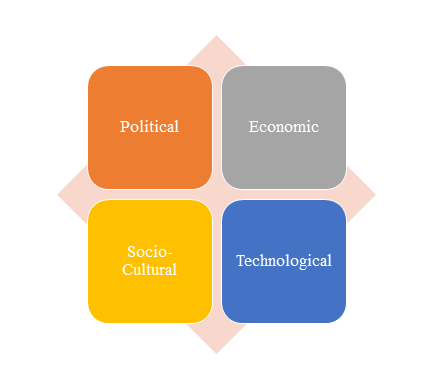
- Benefits of a PEST analysis:
- It helps you to spot business opportunities, and it gives you advanced warning of significant threats.
- It reveals the direction of change within your business environment. This helps you shape what you’re doing, so that you work with change, rather than against it.
- It helps you avoid starting projects that are likely to fail, for reasons beyond your control.
- It can help you break free of unconscious assumptions when you enter a new country, region, or market; because it helps you develop an objective view of this new environment.
2)Porter’s Five Force Model Analysis
The Porter’s Five Force Model is a tool that can be used to analyze the opportunities and overall competitive advantage. The five forces that can assist in determining the competitive intensity and potential attractiveness within a specific area.
- Threat of New Entrants: Profitable industries that yield high returns will attract new firms.
- Threat of Substitutes: A substitute product uses a different technology to try to solve the same economic need.
- Bargaining Power of Customers: the ability of customers to put the firm under pressure, which also affects the customer's sensitivity to price changes.
- Bargaining Power of Suppliers: Suppliers of raw materials, components, labor, and services (such as expertise) to the firm can be a source of power over the firm when there are few substitutes.
- Competitive Rivalry: For most industries the intensity of competitive rivalry is the major determinant of the competitiveness of the industry.
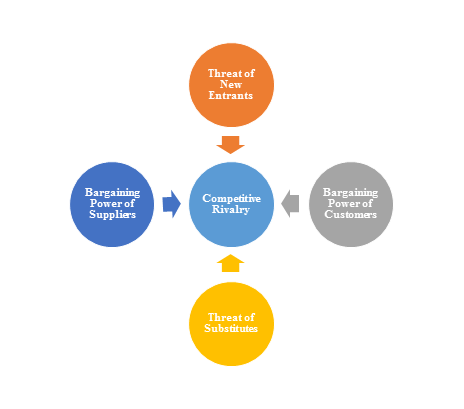
3)Value Chain Analysis
Value chain analysis is a tool to identify activities, within and around the firm and relating these activities to an assessment of competitive strength. Value chain can be analyzed by primary activities and supportive activities. Primary activities include: inbound logistics, operations, outbound logistics, marketing & sales, service. Support activities include: technology development, human resource management, management, finance, legal, planning.
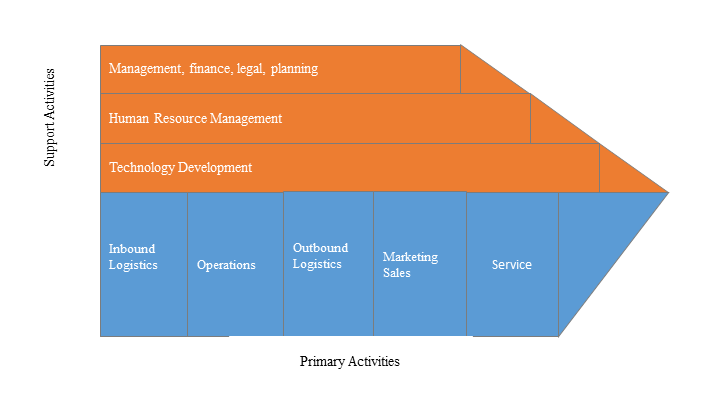
4)SWOT Analysis
SWOT analysis is a tool used to evaluate a company's competitive position by identifying its strengths, weaknesses, opportunities and threats. The strengths and weakness is the inner factor; the opportunities and threats are the external factor. By analyzing the inner and external factors, the analysis can provide the detail information of the position of a player and the characteristics of the industry.
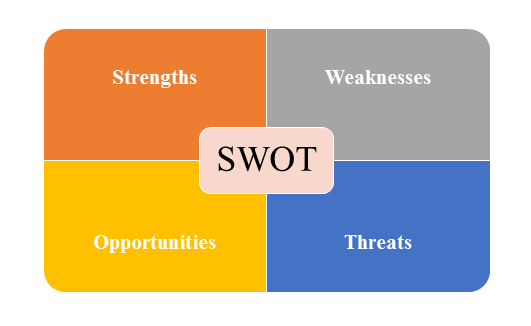
- Strengths describe what the player excels at and separates it from the competition
- Weaknesses stop the player from performing at its optimum level.
- Opportunities refer to favorable external factors that the player can use to give it a competitive advantage.
- Threats refer to factors that have the potential to harm the player.
- Data Sources
| Primary Sources | Secondary Sources |
|---|---|
| Face to face/Phone Interviews with market participants, such as: Manufactures; Distributors; End-users; Experts. Online Survey |
Government/International Organization Data: Annual Report/Presentation/Fact Book Internet Source Information Industry Association Data Free/Purchased Database Market Research Report Book/Journal/News |